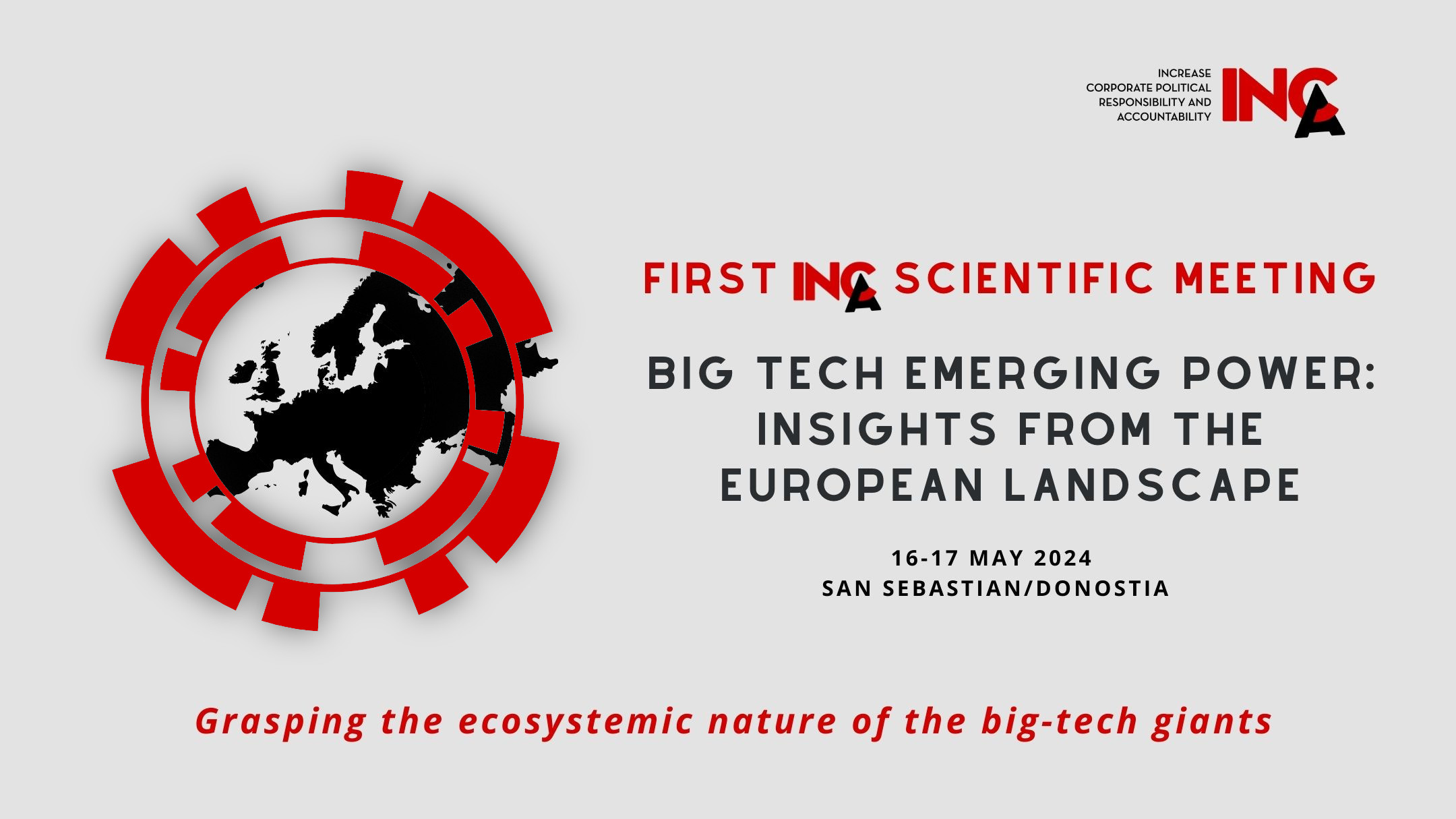
- This event has passed.
First INCA Scientific Event
16 May 2024 @ 8:00 am - 17 May 2024 @ 5:00 pm CEST

The GAFAM wield multifaceted power. They shape opinions, organize and promote new forms of labour, influence politics through lobbying activities, and exert their influence throughout society. Furthermore, they represent a hegemonic approach to business, consolidating power over data, algorithms, and AI. They serve as both digital infrastructures supporting nearly all our online activities, and material infrastructure through ownership of data centres, cloud regions, submarine fibre cables, and warehouses spread across the country. As crucial players in our global landscape, they warrant careful and thorough investigation and discussions.
On the 16th and 17th of May 2024, in San Sebastian/Donostia will be held the first Scientific Meeting of the INCA project that will try to grasp the ecosystemic nature of these giants. The title is “Big Tech Emerging Power: Insights from the European Landscape” and will see a dozen researchers involved in the project exposing their fieldwork and theoretical analysis. Furtherly, a critical dialogue will be performed in the evening of the first-day meeting: it will be chaired and introduced by Sandro Mezzadra (University of Bologna) and implemented by Nick Srnicek (King’s College London) and Manuela Bojadžijev (Humboldt University Berlin).
After the first-year life of the INCA project, the scientific conference aims to address and discuss the first results of the research. It will be organized in four sections diversified but integrated that will be focused on different aspects. The first section will focus on GAFAM’s political power. It will host speeches related to how platforms implement their political role, the lobbying they do for specific political purposes and how their power should be regulated. The second section it will analyse how these platforms construct and propagate a hegemonic narrative about themselves, contributing to a broader cultural transformation. The third one is titled Infrastructural labour power and will delve into the immense economic influence of these platforms, especially in transforming industrial relations: perspective and examples from Italy, Poland, Portugal, and Spain will be presented. Finally, the morning of the second day will host the panel titled Platform alternatives and counterpowers, tackling the resistance process that characterized the last decade.
The first INCA Scientific Meeting will serve the dual purpose of fostering further discussion among researchers who have recently begun collaborating and providing another opportunity to disseminate the initial results to a larger audience. What follows is the full Program of the Conference. See you there!
Program of the Conference
16th May
9.45 – 10.00 Welcome
Morning
10.00-11:30: Political Power
- Regulating platform power (Inge Graef, University of Tilburg)
- How GAFAM lobbied for the Digital Services Act (Edoardo Mollona, University of Bologna)
- Platform power: Technic, Aesthetics, Hegemony (Mattia Frapporti, University of Bologna)
Chair: Edoardo Mollona, University of Bologna
11.30-11.45 Break
11.45-13.00: Discourse & Cultural Power
The discourse on GAFAM: what people say when they talk about GAFAM (Martin Molder, University of Tartu)
- Platform Political Discourse: Hegemony & Counter-hegemony (Edoardo Mollona, University of Bologna)
Chair: Mattia Frapporti, University of Bologna
14.30-16.00: Infrastructural Labour Power
Convergence or path-dependency? The impact of platformisation on industrial relations models in the EU (Olga Gitkiewicz and Szymon Pilch, University of Wroclaw)
- “Algocratic governance” and contemporary forms of labour relationships: the case of Spain’s ‘rider law’ (Ignacio Elpido Dominguez Ruiz and Fabiola Mancinelli, University of Barcelona)
- Infrastructural power of Big Tech Labour (Franco Tomassoni COLABOR, Lisbon)
Chair: Maurilio Pirone, University of Bologna
16.30 – 18.00 Critical dialogue (learn more)
Chair and introduction: Sandro Mezzadra (University of Bologna),
Panelist: Nick Srnicek (King’s College London)
17th May
Morning: Platform Alternatives and Counterpowers
10:00-11:30
- Exploring Platform Alternatives: Shaping a Responsible Future (Alina Kontareva, Alexander Von Humboldt, HIIG)
- Designing Alternatives (Chiara Faini and Marta Meloni, Fondazione Innovazione Urbana, Bologna)
- GAFAM Workers and their Discontent (Renato Miguel do Carmo, COLABOR, Lisbon)
Chair: Niccolò Cuppini, SUPSI
12:00-13:00: Final remarks and pathways towards the book